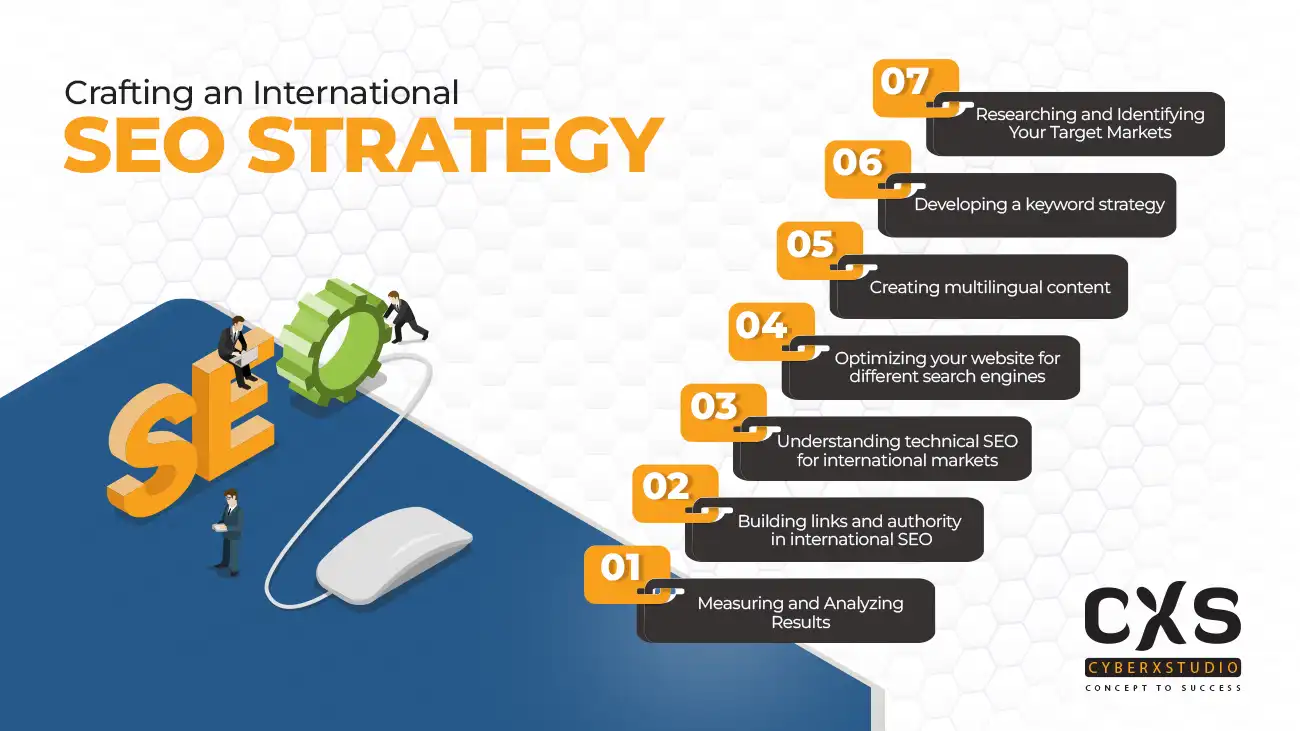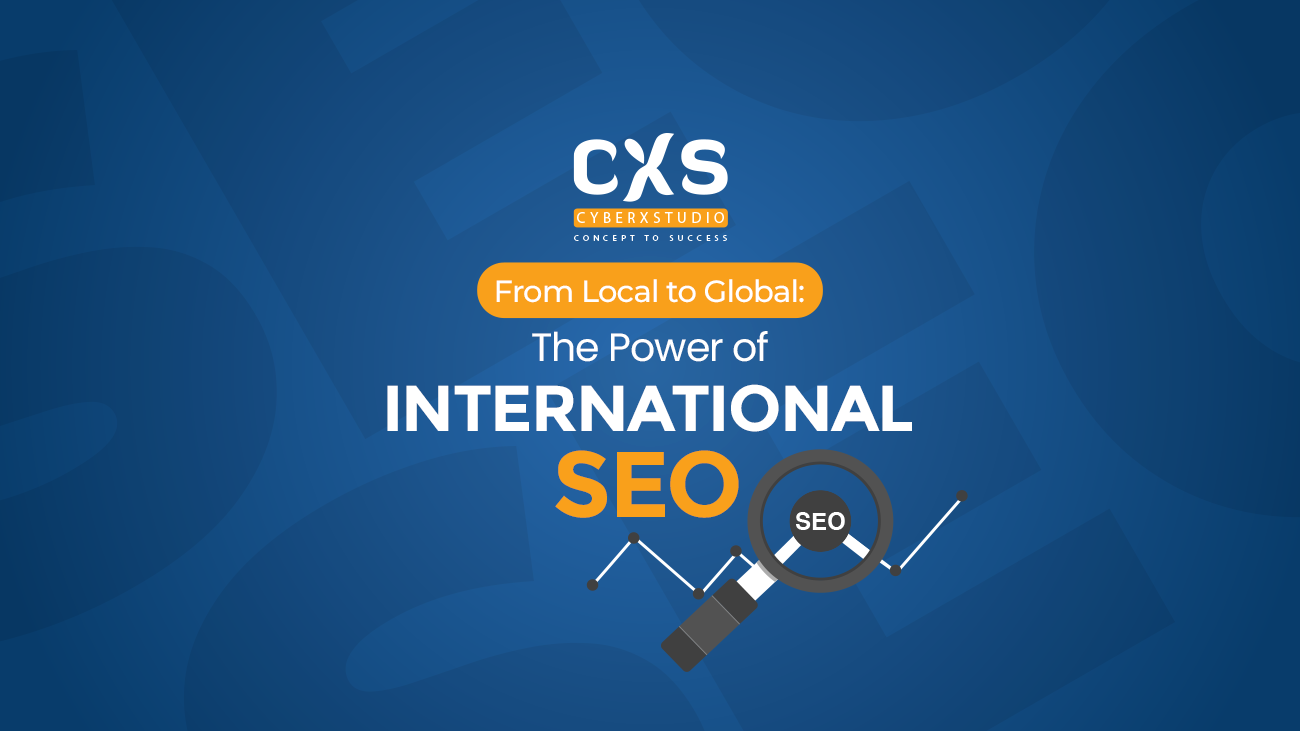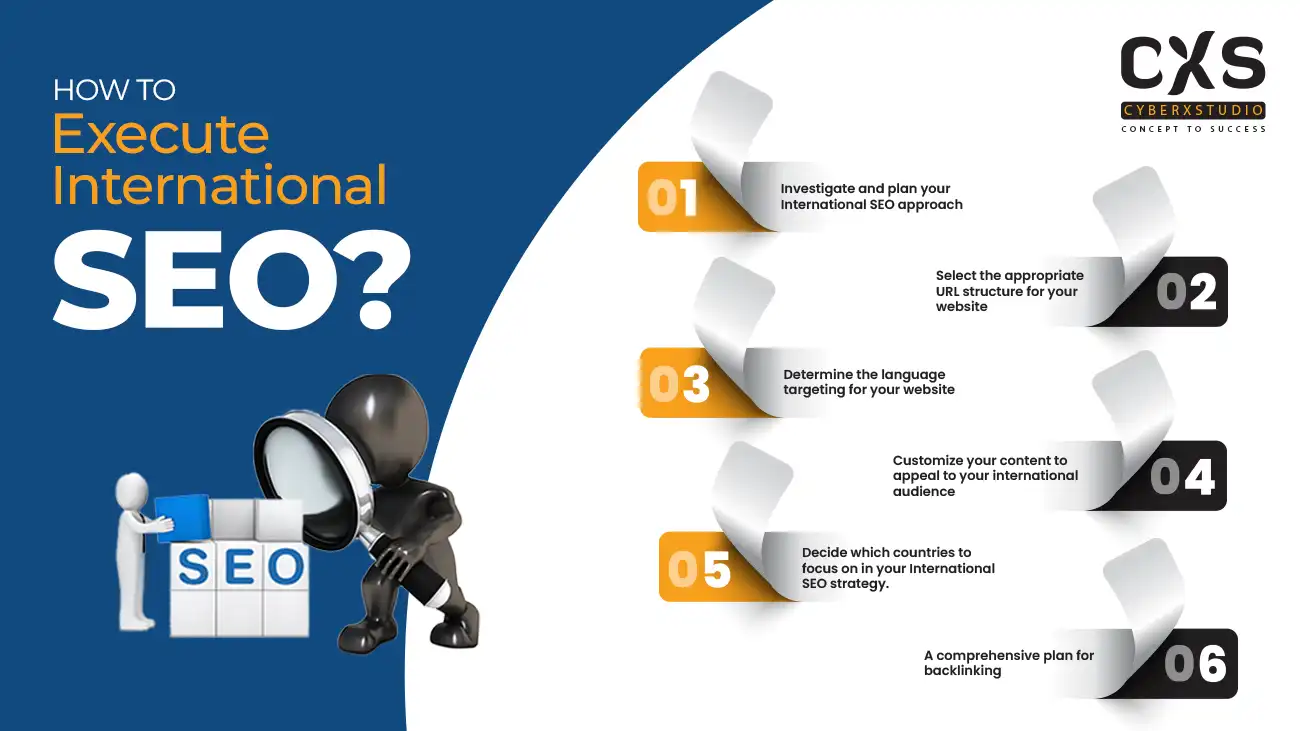If you are looking to expand your services beyond borders and reach out to international audiences, then international SEO is the key. Not all websites may be suited for global audiences, but if yours has the potential, then optimizing your webpage for international search engines can significantly boost your reach and drive more traffic to your website.
With over 5.16 billion internet users worldwide, the possibilities of reaching new markets and customers are endless.
However, to succeed in international markets, you need to understand and realize the nuances of different languages, cultures, and search engine algorithms. This is where international SEO comes in, helping you create a strong online presence across borders and increase your visibility in global search results.
By implementing international SEO best practices, you can tailor your content to different regions, languages, and cultures, making it more relevant and appealing to your target audience. This, in turn, can increase your website’s traffic, conversions, and revenue and help you establish a strong brand presence in new markets.
Whether you’re an e-commerce store looking to expand your sales internationally or a content creator looking to reach a wider audience, international SEO can help you achieve your business goals. So, if you’re ready to take your website to the global stage, let’s discuss this powerful aspect in detail in our international SEO blog and unlock its full potential.
Read our recent blog for more awareness. Skyrocket Sales with Proven SEO Lead Generation Strategies
Understanding International SEO
Today, it’s all about globalization, and businesses are no longer limited to their local markets. With the rise of the internet and e-commerce, it has become easier for businesses to expand their operations worldwide. However, to succeed in a global marketplace, businesses need to have an effective international SEO strategy in place. In this blog section, we will dive deeper into what international SEO is, how it differs from local SEO, and why it is essential for businesses to have an international SEO strategy.
What Is International SEO?
International SEO is a comprehensive process of optimizing your web pages and their content to rank on top of search engine pages (SERPs) in different countries and languages. It involves a set of techniques and tactics to make your website more visible and accessible to users in different regions worldwide. International SEO includes everything from optimizing your website’s content and metadata to creating region-specific pages and implementing hreflang tags.
When it comes to international SEO, there are three primary approaches that businesses can take:
- CCTLDs (Country Code Top-Level Domains): This approach involves creating separate websites with a country-specific top-level domain (TLD), such as .uk or .de, for each country that you want to target. This approach is indeed the most effective way to target users in different countries, but it can also be the best approach. Businesses can create subdomains, such as de.yourdomain.com or uk.yourdomain.com, to target users in different countries. This approach is less expensive than ccTLDs, but it may not be as effective.
- Subdirectories: This approach involves creating separate directories, such as yourdomain.com/de or yourdomain.com/uk, to target users in different countries. This approach is the easiest and least expensive, but it may not be as effective as ccTLDs.
How Does International SEO Differ From Local SEO?
While international SEO and local SEO have some similarities, they are fundamentally different approaches. Local SEO mainly focuses on optimizing your website for local searches and audiences, while international SEO services focus on targeting users in different countries and languages.
Local SEO includes optimizing your website’s content for local keywords, creating local business listings, and building local citations. The goal of local SEO is to get a higher rank for your website on search engines related to your business’s location, such as “restaurants near me” or “plumber in New York.”
On the other hand, international SEO involves optimizing your website’s content for different languages and regions worldwide. This includes translating your content into different languages, creating region-specific pages, and implementing hreflang tags to signal to search engines which language and country your content is intended for.
Why Is It Essential To Have An International SEO Strategy?
Having an effective international SEO strategy is crucial for businesses that want to expand their operations globally. Here are the key benefits of having an international SEO strategy:
Increased Visibility
By optimizing your website for different languages and regions, you can increase your visibility and reach more customers worldwide.
More Traffic
An effective international SEO strategy can help you generate more traffic from different regions and languages, which can lead to more leads and sales.
Better user experience
By providing users with region-specific content in their native language, you can create a better user experience and increase engagement.
Competitive Advantage
By having an effective international SEO strategy, you can gain a competitive advantage over businesses that are not targeting global audiences.
In short, international SEO is a crucial component of any global business’s digital marketing strategy. By optimizing your website for different languages and regions, you can increase your visibility, reach more customers, and generate more revenue from different parts of the world.
Crafting An International SEO Strategy
Now that we understand the significance of having an international SEO strategy, let’s delve into how businesses can develop an effective strategy to reach their global audience. Creating an international SEO strategy requires careful planning and execution to ensure that your website is optimized for different languages and regions worldwide. Let’s get into the details of our well-researched international SEO audit list.

Researching And Identifying Your Target Markets
The first step in developing an effective international SEO strategy is researching and identifying your target markets. This involves analyzing market trends, identifying potential customers, and understanding their needs and preferences.
To research and identify your target markets, you should consider the following:
- Analyze your website’s traffic: Review your website’s analytics to see which countries and languages your website visitors are coming from. This will give you an idea of where to focus your international SEO efforts.
- Conduct market research: Conduct detailed market research to understand your target audience’s needs, preferences, and behaviors. This will help you tailor your content to resonate with your target markets.
- Analyze competition: Analyze your competitors’ international SEO strategies to see what’s working for them and where you can improve.
Developing A Keyword Strategy
Once you have identified your target markets, the next step is to develop a keyword research strategy. This involves identifying the keywords that your target audience is using to search for your services.
To develop a keyword strategy, you should:
Conduct Keyword Research
Use keyword research tools to identify the best keywords that your potential audience commonly uses to search for your services or products.
Analyze Search Volume and Competition
Analyze the search volume and competition for each keyword to identify the most relevant and profitable keywords to target.
Localize Keywords
Localize your keywords by using local language and terminology to target users in different countries and regions.
Creating Multilingual Content
Creating multilingual content is a crucial part of any international SEO strategy. This involves translating your website’s content into different languages to target users in different countries and regions.
You can do this by:
Hire Professional Translators
Hire professional translators to ensure that your content is translated accurately and effectively.
Localize Content
Localize your content by adapting it to the local language, culture, and customs of your target markets.
Optimize Content for SEO
Optimize your multilingual content for SEO by incorporating relevant keywords and optimizing meta tags and descriptions.
Optimizing Your Website for Different Search Engines
Different search engines are popular in different countries and regions. For example, Google is the most popular search engine in the US, while Baidu is the most popular search engine in China. To ensure that your website is visible in different search engines, you need to optimize it accordingly.
While optimizing your website for different search engines, you should consider the following:
Identify Popular Search Engines in Your Target Markets
Identify the search engines that are popular in your target markets and optimize your website accordingly.
Localize Content
Localize your content by adapting it to the language and culture of your target markets.
Optimize Meta Tags and Descriptions
Optimize your meta tags and descriptions to target the specific search engines in each country or region.
Understanding technical SEO for international markets
Technical SEO is an important aspect of international SEO. This involves optimizing your website’s technical elements, such as site structure, URLs, and schema markup, to improve its search engine visibility.
To understand technical SEO for international markets, these considerations are crucial:
Use Hreflang Tags
Implement hreflang tags to indicate to search engines which language and country your content is intended for.
Localize URLs
Localize your URLs by using country-specific TLDs or subdirectories to target users in different countries and regions.
Use Schema Markup
Consider using schema markup to provide search engines with additional and extra information about your website’s content, such as location, product information, and reviews.
Implement Geo-targeting
Use Geo-targeting to show different content to users in different regions based on their location.
Building links and authority in international SEO
Link Building and authority is an essential aspect of international SEO. These are some strategies to help you build links and authority in international SEO:
Conduct Thorough Keyword Research
To build links and authority in international SEO, it is essential to conduct thorough keyword research. You need to identify appropriate keywords that are relevant to your target audience and are used in your target countries. This will help you to optimize your content, create linkable assets, and build authority.
If you want to master the art of keyword research? Visit our recent blog “Mastering Keyword Research: A Beginner’s Guide” and give your content strategy a boost.
Create High-Quality Content
Creating high-quality content that is relevant to your target audience(dream buyer) is key to building links and authority. Make sure your content is unique, informative, and provides value to your audience. This will encourage other websites to link to your content, which will help increase your authority.
Develop Relationships With Influencers and Bloggers
Building relationships with influencers and bloggers in your target countries is another effective way to build links and authority. These relationships can help you to reach a wider audience and attract links from reputable websites.
Leverage Social Media
Social media is an excellent platform to build links and authority. Sharing your content on social media marketing can help to attract links and increase your authority. You can easily engage with your target audience on social media, which can help to build relationships and increase your authority.
Monitor Your Backlink Profile
Monitoring your backlink profile is essential to building links and authority. You need to identify and remove any low-quality or spammy links that could harm your authority. You can also use backlink analysis tools to identify opportunities for link building.
Measuring and Analyzing Results
Measuring and analyzing results is essential to the success of international SEO. Here are some strategies to help you measure and analyze your results using an international SEO checklist:
Set Measurable Goals
Before you start your international SEO campaign, you need to set measurable goals using an international SEO checklist. The goals have to be specific, measurable, achievable, relevant, and time-bound. This will help you to track your progress and measure your success.
Use Web Analytics Tools
Web analytics tools, such as Google Analytics, can help you to track your website’s performance according to your international SEO checklist. You can use these tools to monitor your website’s traffic, bounce rate, conversion rate, and other key metrics. This will help you to identify areas for improvement and optimize your website for better results.
Monitor Your Competitors
Monitoring your competitors is an essential part of international SEO, according to your international SEO checklist. You need to identify your competitors’ strengths and weaknesses and use this information to improve your own SEO strategy. You can use tools like SEMrush or Ahrefs to monitor your competitors’ backlink profiles, keyword rankings, and other key metrics.
Analyze your Website's Structure and Content
Analyzing your website’s structure and content is crucial to international SEO success, according to your international SEO checklist. You need to ensure that your website is properly structured and optimized for your target audience. You can also use tools like Screaming Frog or DeepCrawl to analyze your website’s structure and identify areas for improvement.
Test and Iterate
Testing and iterating are essential to international SEO success, according to your international SEO checklist. You need to test different strategies and tactics to see what works best for your target audience. You can even use A/B testing and other testing tools to measure the effectiveness of your SEO strategies and make data-driven decisions with the help of a skilled international SEO company.
How to Execute International SEO?
Acquiring knowledge about international SEO strategies is certainly valuable, but it’s crucial to understand how to implement them effectively. Simply knowing the strategies won’t guarantee success in your international SEO endeavors. Therefore, it’s essential to explore the practical ways of implementing these strategies to maximize their potential impact on your website’s visibility and ranking.
Investigate and Plan Your International SEO Approach
Before you can execute an effective international SEO strategy, you need to do your research and plan your approach. This involves identifying your target countries and analyzing your competition in those countries. You’ll also need to determine which search engines are popular in each country and which keywords you should target to optimize your website for those search engines.
When investigating your target countries, you should consider factors such as market size, competition, and language. For example, if you’re targeting a country where English is not the primary language, you’ll need to ensure that your content is translated into the appropriate language.
Select the Appropriate URL Structure for Your Website
Your website’s URL structure can have a significant impact on your international SEO strategy. There are various options to choose from, including ccTLDs, subdomains, subdirectories, and gTLDs.
A ccTLD is actually a country code top-level domain that represents a specific country or territory, such as .ca for Canada or .fr for France. Using a ccTLD can help you rank higher in search engines in that country and make it easier for users in that country to find your website.
Alternatively, you can use subdomains or subdirectories to create language-specific versions of your website. For example, you could use en.yourdomain.com for your English content and es.yourdomain.com for your Spanish content. This can be a wise option if you are targeting multiple countries with different languages.
Finally, you can use a gTLD, such as .com or .net, and use hreflang tags to signal to search engines which language versions of your content to display in different countries. This option can be more flexible than using ccTLDs or subdomains.
Determine the Language Targeting for Your Website
If you’re targeting multiple countries with different languages, you’ll need to determine how to handle language targeting. This can involve using different URL structures or using hreflang tags to signal to search engines which language versions of your content to display in different countries.
Hreflang tags are HTML tags that indicate the language and geographic targeting of a page. By using hreflang tags, you can help search engines understand which version of your content to display to users in different countries.
Customize Your Content to Appeal to Your International Audience
To appeal to your international audience, you’ll need to customize your content. This can include translating your content into the appropriate language and adapting your tone to match your target audience. You’ll also need to incorporate local keywords and cultural references to ensure that your content resonates with users in each country.
For example, if you’re targeting users in France, you’ll need to ensure that your content uses French keywords and phrases and incorporates cultural references that are relevant to users in France.
Decide Which Countries to Focus on in Your International SEO Strategy
Not all countries are equal when it comes to international SEO. You’ll need to decide which countries to focus on in your strategy based on factors such as market size, competition, and search engine popularity. For instance, if you’re a Canadian company looking to expand into the US, you’ll need to focus on optimizing your website for search engines in the US. Alternatively, if you’re a global company looking to expand into multiple countries, you’ll need to prioritize which countries to target first based on market size and competition.
A Comprehensive Plan For Backlinking
Backlinks are an essential part of any SEO strategy, and this is also true for international SEO. You’ll need to create a comprehensive plan for building backlinks from relevant websites in your target countries to improve your website’s authority and visibility in those countries. To build backlinks, you can use a variety of tactics, such as guest blogging, broken link building, and influencer outreach. You’ll also need to ensure that your content is high-quality, appropriate, and relevant to your target audience to increase the likelihood of other websites linking to your content.
In addition to building backlinks, you should also monitor your website’s backlink profile to ensure that you’re not accumulating low-quality or spammy links that could hurt your website’s search engine rankings. You can use tools such as Google Search Console and Ahrefs to monitor your backlink profile and identify any potential issues. Finally, it’s important to remember that building high-quality backlinks takes time and effort. You’ll need to be patient and persistent in your efforts to build a strong backlink profile for your international SEO strategy.
Factors Affecting International SEO
When executing an effective international SEO strategy, several factors come into play. Understanding these factors is crucial as they can significantly impact your website’s visibility, ranking, and authority in your target countries. Below are some of the most critical factors affecting international SEO.
Customer Reviews
Customer reviews can significantly impact your website’s visibility and ranking in local search results. Positive reviews can improve your website’s visibility in search results and enhance your website’s reputation, while negative reviews can lower your website’s visibility and discourage potential customers from engaging with your website.
Therefore, it’s crucial to encourage your customers to leave positive reviews on your website and other relevant platforms such as Google My Business optimization , Yelp, and Facebook. Responding to customer reviews can also help build trust and credibility with your target audience.
Mobile Responsiveness
As more people use mobile devices to browse the internet, having a mobile-responsive website is critical for your international SEO strategy. Google prioritizes primarily mobile-friendly websites in its search results, making it essential to ensure that your website is optimized for mobile devices.
A mobile-responsive website ensures that your website looks and functions correctly on mobile devices, providing a positive user experience and increasing the likelihood of engagement with your website.
Google My Business Account
Having a Google My Business account is critical for local SEO. It enables you to manage your online presence on Google and appear in local search results. A well-optimized Google My Business account can significantly improve your website’s visibility and ranking in local search results.
Ensure that your Google My Business account is up-to-date and accurate and includes relevant information such as your business name, address, phone number, website, and business hours.
Are you looking to optimize your Google My Business profile and enhance your local SEO efforts? If so, we’ve got you covered with our recent blog post Google My Business Optimization, which provides a comprehensive guide to optimizing your business account.
Link Building
Link building is an integral aspect that influences international SEO. It pertains to securing top-notch backlinks from pertinent and authoritative websites. This strategy enhances your website’s prominence and discoverability in search results. To optimize your international SEO efforts, it is imperative to devise a comprehensive link-building strategy and execute it consistently. Expert international SEO professionals in a reputable agency advocate various effective link-building tactics such as guest blogging, broken link building, and influencer outreach.
To Sum Up
In conclusion, international SEO has become an essential aspect of digital marketing, especially for businesses looking to expand their reach beyond their local market. The power of international SEO lies in its ability to help businesses rank higher in search engines in various regions and countries, which can lead to increased traffic, sales, and revenue.
Effective international SEO strategies involve understanding the differences in search behavior, cultural nuances, and language preferences of different target markets. This requires conducting extensive research and tailoring content and keywords to fit the specific needs of each market.
Furthermore, businesses need to optimize their website for technical SEO, ensuring it meets the requirements of search engines in various countries and regions, such as using the correct language tags, hreflang attributes, and geolocation targeting.
While the world is becoming increasingly interconnected and globalized, international SEO has become a crucial tool for companies looking to expand their customer base and tap into new markets. By investing in international SEO, businesses can increase their visibility, credibility, and reach, ultimately leading to long-term success and growth.
About CXS
At CyberX Studio, we customize the way cyberspace can elevate your business growth with the help of digital marketing services and skyrocket your revenues. We are the best digital marketing agency to strategize, develop, and execute robust and reliable web solutions and digital marketing systems for your business to succeed online.
FAQs
International SEO involves optimizing a website to rank in search engines across different countries and languages. It is important because it helps businesses enhance their reach and tap into new markets. By optimizing their website for international search engines, businesses can improve their visibility and attract more traffic and customers from different parts of the world.
The best practices for International keyword research include using keyword research tools that support multiple languages, analyzing search volume and competition in different countries, and taking into account cultural nuances and differences in search behavior. You should also consider using long-tail keywords and focusing on local keywords that are relevant to your target audience.
To make sure that your web page is accessible to international audiences, you should use a responsive design that adapts to various types of screen sizes and devices. You should also use clear and concise language, avoid idioms and cultural references that may not translate well, and provide options for users to switch between different languages and regions.
Common mistakes to avoid when implementing International SEO include
- not using hreflang tags or using them incorrectly,
- not creating country-specific domains or subdomains,
- not translating content accurately or using automated translation tools, and
- not considering cultural differences and local SEO factors.
To measure the success of your International SEO efforts, you can use metrics such as organic search traffic, keyword rankings, conversion rates, and engagement metrics. You should also track the performance of your website in different countries and languages using tools such as Google Analytics and Search Console.

Usman Javed
SEO Specialist
Usman Javed is a competent SEO Specialist with a deep understanding of search engine marketing and optimization. With over 3 years of experience under his belt, Usman has a talent for successfully managing multiple projects to drive business growth and deliver tangible results that make a real impact in escalating SEO rankings.




